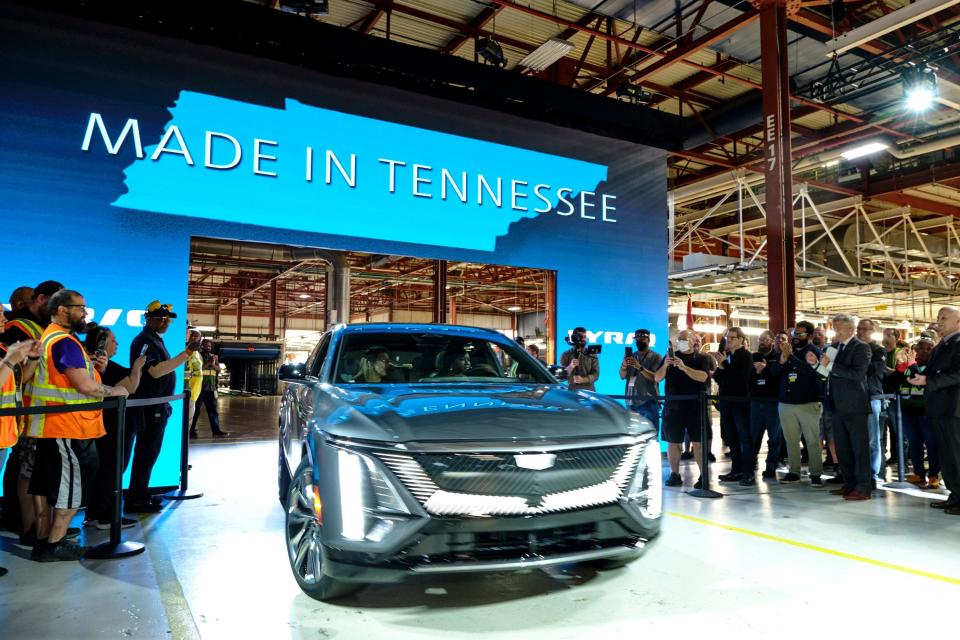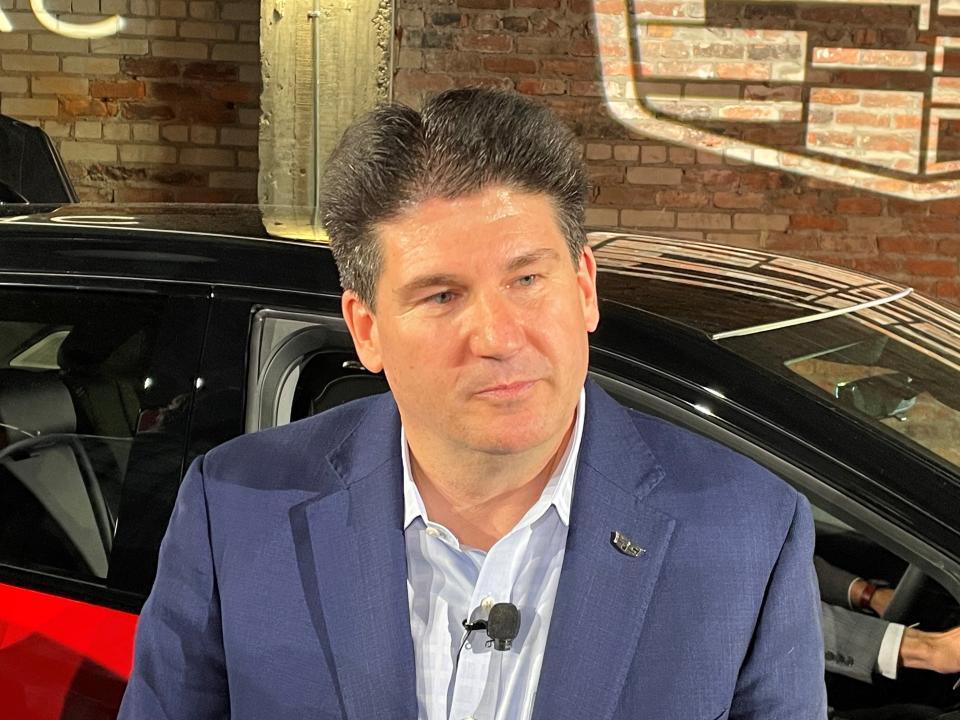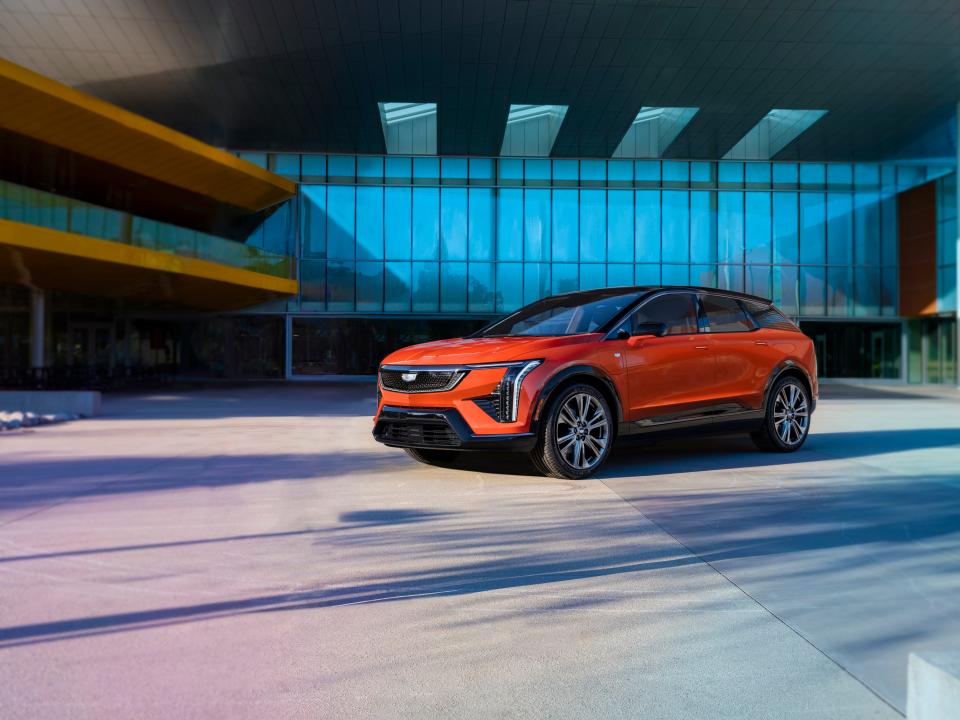GM's Cadillac backtracks, says gas vehicles likely to stay in lineup beyond 2030
General Motors' luxury brand Cadillac will likely not have an exclusively all-electric portfolio of vehicles by the end of the decade, after all.
During a media event Wednesday morning, Global Cadillac Vice President John Roth said the brand will offer a full line of electric vehicles by 2030 but it will likely continue selling gasoline-powered vehicles for some time, too.
"EVs and ICE (internal combustion engine), we want to be clear, will coexist for a number of years," Roth said. "We want to make sure that we have that luxury of choice in the marketplace and both will have an opportunity to meet the customer needs as we look forward."

The latest statements contradict what past Cadillac leaders have publicly said. In 2019, Steve Carlisle, then-president of Cadillac told the media, "None of us knows how long this transition will take. We will be there with internal combustion engines, as well as electric" for a period, said Carlisle. "But the majority, if not all, Cadillacs will be electric by 2030."
Carlisle, who last year retired as GM's president of North America, went on to dub 2030 as, "the end of the ICE age for Cadillac."
In 2021, Cadillac’s then global vice-president, Rory Harvey, told Automotive News, "We will be leaving this decade as an EV brand, as things stand today, which means that we will not be selling ICE vehicles by 2030."
Harvey is GM's president of North America now.
When asked by the news media Wednesday to clarify Harvey's 2021 quote, Roth said, "We are always listening to the customer. We are still on strategy of offering an all-EV portfolio by the end of the decade and we're going to listen to the customer and let them be our guide. That's our answer."
A slower transition
Annual EV sales continue to grow in the U.S. market, but the growth rate has slowed notably, said Cox Automotive in an industry report it put out last month. First quarter EV sales increased by 2.6% compared with the year-ago period, but plummeted 15.2% compared with the fourth quarter of 2023. Cox Automotive wrote that the increase in the fourth quarter was well below the previous two years.

Cadillac spokesman Mike Albano further clarified Wednesday that Cadillac will have an all-electric lineup by 2030 that will accompany gasoline vehicles in the portfolio. He said the earlier commitments to an exclusive EV lineup was "a mission statement if you will. The fact that we refreshed our ICE portfolio should tell you that we knew the transition is going to be slow, the transition will be led by the customer."
GM has recently refreshed the design in nearly every vehicle in the Cadillac lineup except the XT5 SUV, Albano said.
'Deliberately vague' as demand for EVs slows
Sam Abuelsamid, principal analyst for transportation and mobility at Guidehouse Insights in Detroit, was present when Roth made the statement and told the Detroit Free Press that Cadillac is being "deliberately vague as they're trying to navigate a shifting market of EVs."
"Previously, they indicated they would exclusively have a portfolio of all electric vehicles," Abuelsamid said. "Now they're saying they'll have a portfolio of all EVs, but it's not necessarily exclusive."
But if Cadillac does shift its plans for 2030 to include gasoline vehicles, Abuelsamid said it would be a good business move.
"I can’t blame GM or any other automaker that opts to shift the timing of going all-electric," Abuelsamid said. "If a significant proportion of customers can’t or don’t want to buy (battery electric vehicles) you need to be flexible in the products you offer. Just because you build it, it doesn’t mean they will come."
He noted how "fickle" the market is, saying that in the early 2010s automakers were offering small cars and for a time while gas prices were high, consumers bought them. But eventually those consumers decided they wanted bigger vehicles and now big pickups and SUVs dominate sales.
But GM will face higher development costs if it is offering EVs, gasoline and hybridized powertrains all at once. GM could lose out on economies of scale by fragmenting the market, Abuelsamid said.
"In addition to developing battery electric vehicle powertrains and batteries, you also have to continue investing ICE powertrains that will meet increasingly strict emissions and fuel efficiency regulations as well the hybrid hardware," Abuelsamid said. "There is also the software support required for all of these variants. GM and other automakers have already been gutting the engineering staffs with experience on ICE and transmissions and now they have to update that hardware and software."
GM will probably end up relying heavily on the teams developing plug-in hybrids in China for whatever it decides to do in North America, he said.
"Either way, they and other automakers will be spending more money than planned on product development in the coming years," he said.
A competitive edge
But Cadillac's plans for an exclusive all-electric lineup were so solid that, in 2020, it pushed its dealers to commit to making hundreds of thousands of dollars in investments to their dealerships to service and sell EVs. Those who did not wish to make the investment and partake in the all-electric future were offered buyouts.
In 2020, the Detroit Free Press reported that, nationally, 170-180 of Cadillac's 870 dealers, or about 20%, took buyouts that range from $300,000 to $700,000 to give up their franchise rather than make the investment for tools, training, equipment and charging stations to sell and service EVs. In Michigan, "a handful" of the 36 Cadillac dealers opted for the buyout.
Roth told the media Wednesday that Cadillac will still be offering an all-electric portfolio by the end of the decade, but remaining open to letting consumers decide the final composition of Cadillac's lineup gives the brand a competitive edge.

"This idea of having the luxury of choice in our portfolio is a competitive strength," Roth said. "Thirteen models introduced in ICE and EV is a great opportunity for the customer to come to the brand for the very first time looking for their very first EV with Optiq, to those who want to come in and drive an ICE portfolio vehicle like Escalade and XT4."
Roth said the data Cadillac has analyzed showed that in March 2022, the luxury EV segment made up 3.5% to 4% of the total market. Now it is about 14%.
"It hasn't been a straight line, but it is certainly up and certainly higher than the 8% (EV penetration) that we see in the general market," Roth said. "So there is room to grow and there is room for the portfolio to coexist and we're going to take advantage of that with our flexible manufacturing."
What about plug-in hybrid?
GM has been listening to the marketplace. In January, the Detroit Free Press reported that GM CEO Mary Barra told Wall Street analysts that GM will reintroduce plug-in hybrid technology to select vehicles in North America.
Some GM dealers had asked for GM to consider plug-in hybrids — which are propelled by both an electric motor and a gasoline engine for backup — arguing the vehicles would alleviate range anxiety and charging challenges that holds back some car buyers from purchasing a battery-electric vehicle. GM last sold a hybrid in the United States — the Chevrolet Volt — from 2010 to 2019.
When asked whether any Cadillac vehicles will get plug-in hybrid technology on them in the future, Roth again said the brand is "adjusting as the customer tells us the right path in the future. We have a great internal group that is always measuring and monitoring what the customers are desiring in the marketplace. We have those conversations internally all the time."
He added that, "You want to pin us down to absolutes. The one thing I've learned in my 30-plus years about the auto industry is the auto industry does not follow a straight line and there are no absolutes."
More: GM expands list of company cars certain employees can drive to include new EVs
More: Tesla eliminates its EV charging network team just as other carmakers prepare to join it
Contact Jamie L. LaReau: jlareau@freepress.com. Follow her on Twitter @jlareauan. Read more on General Motors and sign up for our autos newsletter. Become a subscriber.
This article originally appeared on Detroit Free Press: GM's Cadillac will sell gasoline and electric vehicles after 2030

